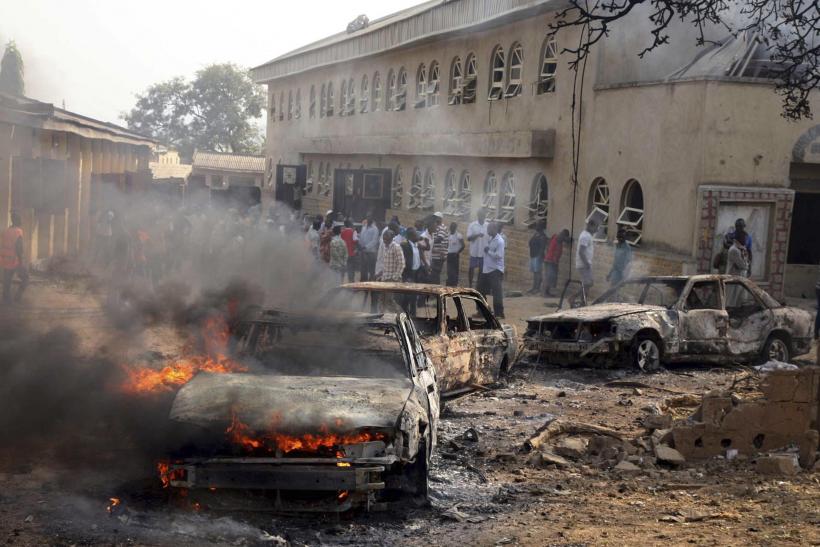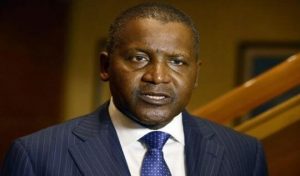Investigation: 2019 is not the year for the #Not Too Young to Run
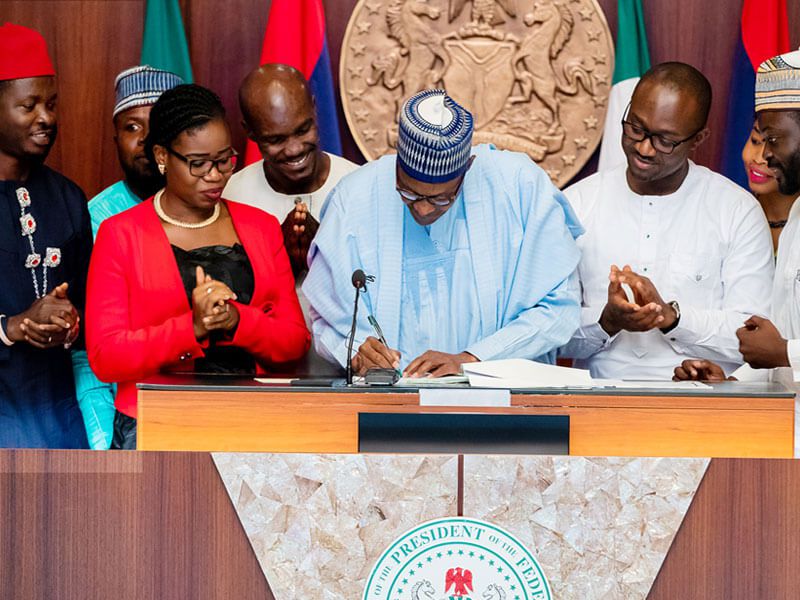
In spite of the groundswell on agitations for an amendment to the 1999 constitution to lower the age bar to enable young Nigerians to scale it and contest the presidency, only 9 out of about 40 aspirants that have shown interest in the top are below the age of 40.
President Muhammadu Buhari, on June 4, 2018, signed the famous #Not Too Young to Run bill into law, ostensibly to please the civil society organisations who have made capital out of the project on the social media and through advocacy visits to the National Assembly.
The Act effectively amends Sections 65, 106, 131, and 177 of the 1999 Constitution which deal with the required qualification to be garnered by Nigerians who intend to seek election into legislative and executive positions in the country.
For instance, Section 131 of the 1999 Constitution (before the amendment) stated that a presidential aspirant must be 40 years of age and above, while Section 171 of the 1999 Constitution (before the amendment) stipulated that a governorship aspirant should be at least 30 years of age.
The new amendments states thus:
“Section 131 (b) and (c) is amended by substituting the provisions with new provisions as follows: A person shall be qualified for election to the office of the President if –
(b) he has attained the age of thirty;
(c) he is a member of a political party and is sponsored by that political party or he is an independent candidate
Qualifications for election as Governor . Section 177 (b) and (c) is amended by substituting the provisions with new provisions as follows: A person shall be qualified for election to the office of the Governor of a State if –
(b) he has attained the age of thirty;
(c) he is a member of a political party and is sponsored by that political party or he is an independent candidate”.
Apparently, the spellbinding victory of Emmanuel Jean-Michel Frédéric Macron in the 2017 France presidential election was the inspiration on which the #Not Too Young To Run activists rode. Macron, born on December 21, 1977, won the election and was sworn into power as French President on May 14, 2017, before his 40th birthday. Though he had played roles in the executive arm of government in France prior to last year’s election, Macron climbed the tall ladder on the rungs on a virgin political party, La République En Marche!, which struck a chord across the various strata of the French population and gained wide acceptability. Most #Not Too Young to Run campaigners dreamt of re-enacting this feat in Nigeria.
However, available data from newspaper reports on presidential aspirants ahead of the 2019 elections as at the end of June, 2018 have proved that the young have not actually joined the race in the real sense of it. Out of the over 40 aspirants, only nine of them are below 40 (See table below).

As it stands today, none of these names ring a bell among the electorate seven months to the 2019 presidential election. First, apart from announcing their ambition on the pages of newspapers and social media, they have not made the political moves that would give them an edge over the ‘old, recycled and tired’ politicians who have cumbered the ground.
Conversely, older politicians are having a field day, especially with constant and consistent media mention. They engage in visits to media house, plant their billboards in major cities in the country, mobilise the young, semi-literate Nigerians, meet with traditional and religious leaders who are political influencers and engage in party activities. See the table below:
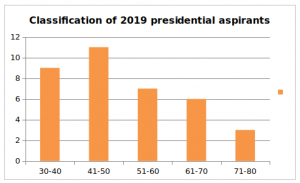
From the above bar chart, it is apparent that aspirants in the age bracket of 41 and 50 have shown more interest. They are 11 out of 38 of the aspirants who have shown interest in the election as at the end of June 2018. They constitute 25 per cent of the total number of presidential aspirants, as shown in the pie chart below:
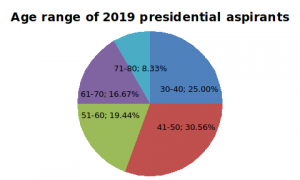
The names of those in this age bracket are:
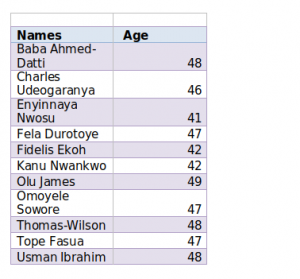
Out of the 11 who belong to this group, four names tend to stand out – Dr Baba Ahmed-Datti, 48, whose billboard stares everyone in the face as he enters Abuja and Lagos. Also, his front page ear-piece advertisements in the Daily Trust and Leadership newspapers speak of his bold entrance into the presidential race and thousands of Nigerians who buy newspapers and more thousands in the ‘free readers association’ notice him as many times as they visit newsstands every day.
Also in this category is the courageous publisher of Sahara Reporters, Omoyele Sowore, 47, whose unbelievable decision to run in the next election can no longer be waved aside by active political players. He is engaged in the mobilisation of supporters online and offline, holding meetings with political stakeholders and pushing hard to prove that he is neither a mediocre nor a pushover in the 2019 power struggle.
In this league is Tope Fasua, 47, a vibrant columnist and pragmatic economist who has begun a movement that is gathering youths with ideas around the remaking of Nigeria. His Abundant Nigeria Renewal Party (ANRP) is engaged in an ambitious project of ensuring that the youths demonstrate their faith in the country by carrying out voluntary activities that show that they own the country, instead of waiting for favour from corrupt Nigerians.
There is also football icon Kanu Nwankwo and a regular aspirant Fela Durotoye who have joined the race. They have a lot of potentials, but they do not tend to push as hard as Nigerians expect them to do.
As it were, in spite of the noises about the age factor in the 2019 elections, the most aggressive aspirants are the aged, those older than 70, as shown in the table below:

Atiku Abubakar is fighting hard in the Peoples Democratic Party (PDP), Professor Jerry Gana is the frontline candidate in the Social Democratic Party, while Muhammadu Buhari is like the unopposed aspirant in the ruling All Nigeria Peoples Party (ANPP). But in the age bracket of 61 and 70 there are several aspirants, but they tend to lack the national spread that is needed to win a presidential election. They are:
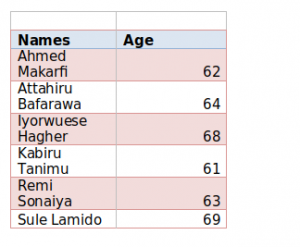
All these aspirants are experienced politicians, especially Ahmed Makarfi, Attahiru Bafarawa, Sule Lamido, who were state governors in the North-West. Kabiru Tanimu, who became prominent in the last regime of Goodluck Jonathan as Minister of Special Duties, has made a name for himself. He worked hard to get Boko Haram militants to lay down their arms and receive amnesty in return. Though it didn’t work out as he envisaged, his effort was impactful all the same.
Perhaps, the most intriguing aspect of the 2019 presidential aspiration is the fact that there are more contenders from the South-West geopolitical zone in spite of the understanding that the next president should come from the Northern half of Nigeria. The table below shows the trend. But this is understandable because most of the younger aspirants come from the South-West. They may actually be positioning themselves for the future, as any impact they make in the current power struggle will accrue to their advantage when the table turns in favour of the South West in the future political dispensation.

The aspirants from the South-West include the following:
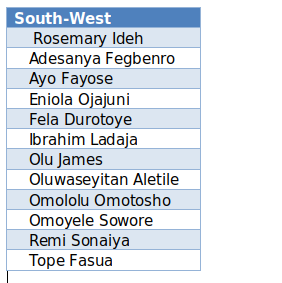
As it stands, 2019 may not be the year for the #Not Too Young to Run, as their skills in the political field show they still lack a lot of political tactics, and need to engage in a lot of political practices in order to qualify for the senior political game of the presidency. Perhaps, they have to experiment their skills are the lower categories of councillorship, state houses of assembly, governorship, house of representatives and senate, to enable them develop the muscle needed to win the presidential prize.
The Insight Report
Nigeria Coverage

